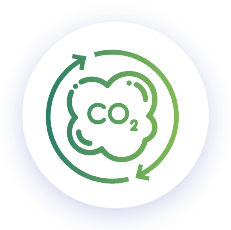PYCASSO,
a territory program
The environmental and climate context brought forward by global bodies as a whole (such as GIEC, IAE, BRGM), forces governments and Europe to adopt policies aiming at reaching the carbon neutrality in 2050.
To do so, several sectors of activity are concerned, among them the industries.
Decarbonation, which is the objective of carbon neutrality of those industries, goes through 3 ways:

the reduction
of CO2 emissions by the optimization of industrial processes,

the valorization of CO2
generated by the direct reutilization of CO2 that could not be eliminated by the optimization of processes,

the geological storage
of the CO2 surplus that could not be valorized, rather than sent off in the atmosphere.

the reduction
of CO2 emissions by the optimization of industrial processes,

the valorization of CO2
generated by the direct reutilization of CO2 that could not be eliminated by the optimization of processes,

the geological storage
of the CO2 surplus that could not be valorized, rather than sent off in the atmosphere.
Geological storage (Carbon Capture and Storage: CCS) enables the reduction of CO2 emissions the time that the setting up of new activities to valorize CO2 for its reutilization (CCU) will take; as well as the optimization of industrial processes by eliminating CO2 in the atmosphere. Thus, it will curb global warming boom, caused by gas emissions. This is then referred as CCUS: Carbon Capture Utilization and Storage.
CCUS (Carbon Capture Utilization and Storage) is highly recommended by European policies and is supported by the instability of the carbon market since the beginning of 2021. A carbon price close to 100€/T makes CCUS economically viable and thus a real leverage for ecological transition.
Geological storage (Carbon Capture and Storage: CCS) enables the reduction of CO2 emissions the time that the setting up of new activities to valorize CO2 for its reutilization (CCU) will take; as well as the optimization of industrial processes by eliminating CO2 in the atmosphere. Thus, it will curb global warming boom, caused by gas emissions. This is then referred as CCUS: Carbon Capture Utilization and Storage.
CCUS (Carbon Capture Utilization and Storage) is highly recommended by European policies and is supported by the instability of the carbon market since the beginning of 2021. A carbon price close to 100€/T makes CCUS economically viable and thus a real leverage for ecological transition.
